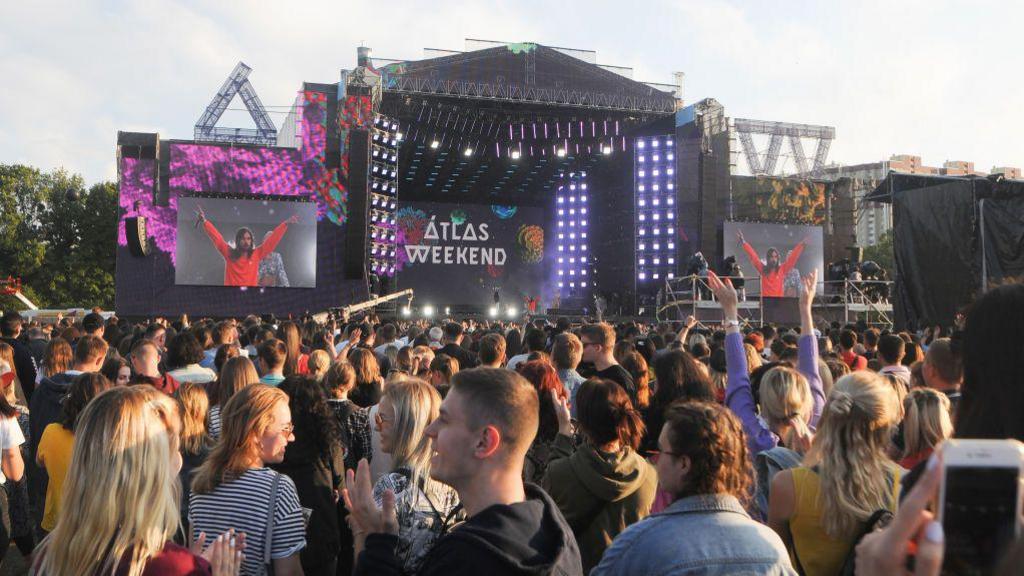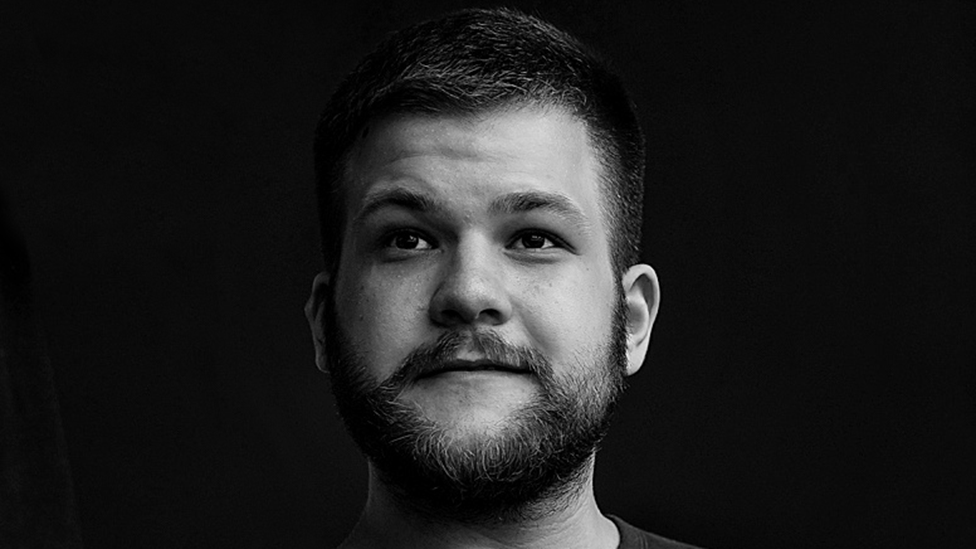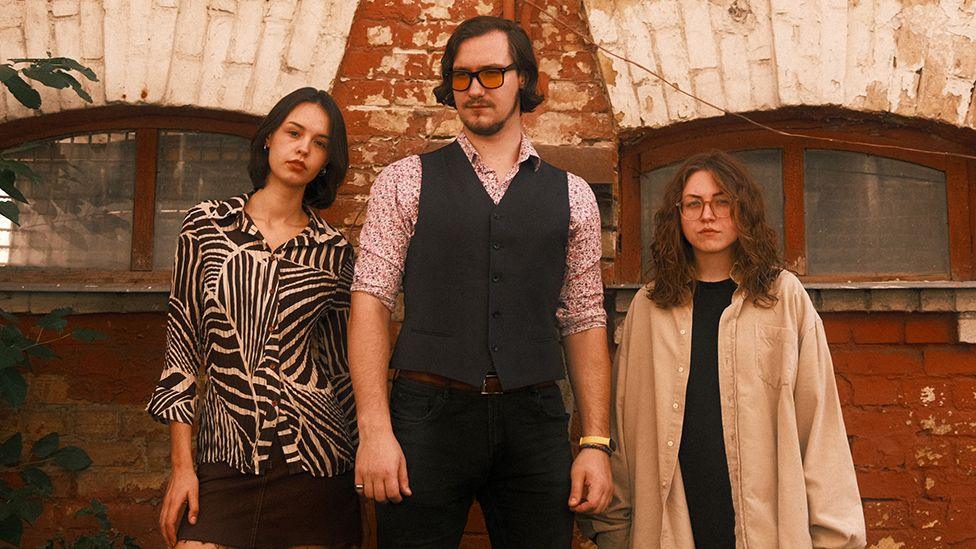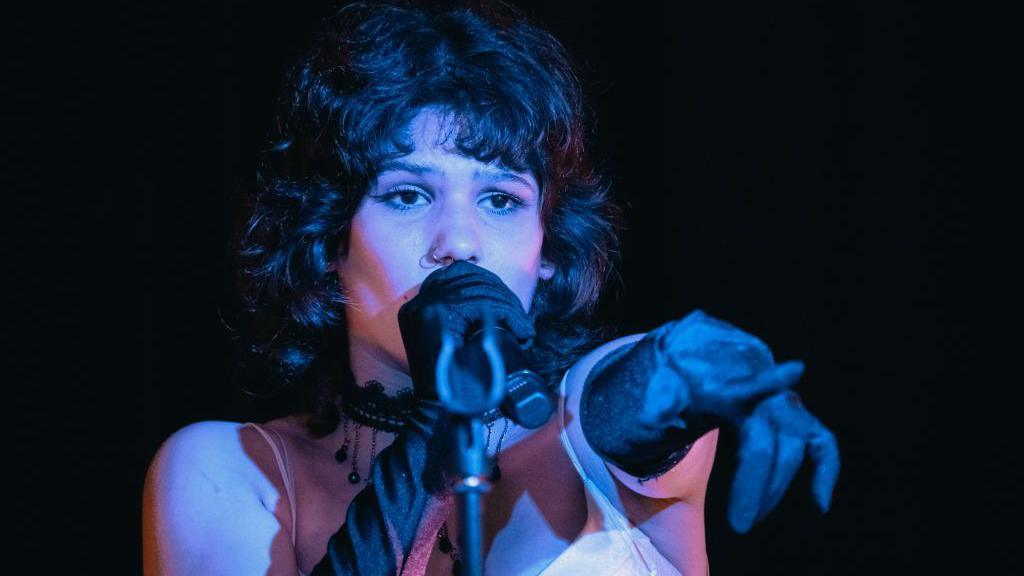Air strikes can’t stop the music at this Ukrainian festival

Before Russia's full-scale invasion in 2022, the festival looked pretty much like any other big music event around the world. This was the main stage in 2019.
- Published
How do you stage a music festival for 25,000 people when you're under threat from a potential Russian missile attack?
That's a question Vlad Yaremchuk has been trying to answer for the past few months.
He's the programme director of Atlas United, Ukraine's biggest music festival.
The event's due to return this weekend for the first time since Russia's full-scale invasion of the country in February 2022.
But it's not quite business as usual - this year's event has relocated to a shopping mall in case of an airstrike.
When Vlad speaks to BBC Newsbeat, Atlas has just been pushed back a week after a series of deadly missile attacks, including one that hit a children's hospital.
He admits that there's been a lot of stress in the lead-up to this year's event, but he's optimistic about it going ahead.
"To finally see people coming into the festival for the first time will be exciting," he says.
"We've really missed that feeling."

Vlad Yaremchuk says this year's Atlas has been organised far more quickly than usual
Since it began in 2015 Atlas, held in Ukrainian capital Kyiv, has hosted huge names such as Kasabian, The Chemical Brothers and Liam Gallagher.
Organising a big festival takes time, but Vlad says they only got the go-ahead for 2024's event this spring.
"Normally for a festival of this size you would need a year or more to organise it," he says.
"We didn't even expect to have a chance to do a festival while the war is still happening."
But, he adds: "The reality showed us that cultural events are still possible in wartime."
Vlad says Atlas is expecting about 25,000 fans, crew and artists to be on site, while other events have only had a maximum of 10,000.
With all those people in one place, a potential air attack is a huge concern.
Vlad says the solution has been the brand new venue - a mixture of open-air and indoor spaces.
There are two stages in the shopping centre's car park, and a further three inside the mall itself.
Can't stop the music
"It gives us a shelter which can fit more than 100,000 people," says Vlad.
"There will be more than enough space to get everyone evacuated quickly -- and we're talking minutes."
Vlad says it can be challenging to convince people - who are so used to hearing air-raid sirens - to head for a shelter when the alarm is raised.
But he says there's a plan for that too - take the festival underground to a sixth performance area in the basement car park.
If the crowd does have to flee to safety Vlad says there's "an entire stage" and a bar so the music can continue.
One thing that will be missing this year is the same number of international headliners.
Vlad says they were approached but most turned it down over safety concerns.
He says he understands the decision, but "seeing international musicians playing in Russia right now really ticks me off".
"That can be frustrating," he says.
"But if people honestly gave it a thought and decided that's not for them because they're scared for their life, that's fair."
It does mean that more homegrown acts will get a chance to take some of the top slots on the bill.

Ukrainian band Disappeared Completely will be taking to the stage at Atlas United
That includes Vitalii and Marina from indie band Disappeared Completely.
"People need some joy in their lives, even through these hard times," says Vitalii.
Marina says: "It's always nice to gather together with people and to celebrate life itself.
"To just remember the joys of everyday life, because you might not have it tomorrow.
"Appreciate these moments and appreciate the people around you while you can."
They also say that after years of attacks from the air, they're no longer worried about performing outside.
"We got used to this. It sounds bad, because it's war, and we could die. But life is going on so we need to adapt," says Vitalii.

Singer Shmiska says she's planning a big performance for her fellow Ukranians
While a festival might seem like a chance to forget about the war for a day, Ukraine's ongoing battle against Russia is reflected by Atlas United.
The festival hopes to raise at least €2m (£1.7m), with most being spent on drones to help soldiers on the front line.
And some Ukrainian acts who've been raising awareness abroad are due to return to perform in their home country.
Solo artist Shmiska, who now lives in Paris, says it's important to come back for the festival.
"People sometimes just start to lose their hope. They start to lose their dreams," she says.
"I think, as artists, it's our job to give people this chance to feel again, to dream again."
Shmiska performs across Europe and says she worries people are starting to forget about Ukraine.
So she's aiming to make her big show in Kyiv memorable, with light shows and plenty of costume changes.
"It's such a big opportunity to feel alive again," she says.
